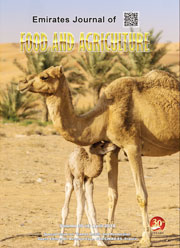DETECTION OF ANTI-FUNGAL GENES IN CHICKPEA (CICER ARIETINUM L.) AND THEIR EFFECTS ON FUNGAL GROWTH
DOI:
https://doi.org/10.9755/ejfa.v21i2.5162Keywords:
Ascochyta rabiei, β-glucanase, Cicer arietinum, Chitinase, Ribosomal Inactivating Protein.Abstract
Anti-fungal genes chitinase, beta-glucanase and ribosomal inactivating proteins (RIP) were detected in chickpea plants when they were artificially exposed to Ascochyta rabei spores. Immunological studies provided evidence for the presence of a chitinase-like proteins in blightinfected chickpea leaves using a poplar chitinase antibody. No activity was detected when a barley chitinase antibody was used, indicating that antifungal proteins in chickpea recognize different antigenic determinants. Purified barley ribosomal inactivating protein (RIP 30) and chitinase (Chi 26) were shown to inhibit the growth of Ascochyta rabiei in vitro. The role of antifungal proteins in the protection of chickpea against pathogen is discussed.










 .
. 